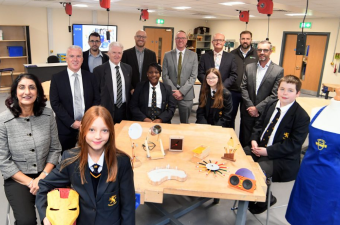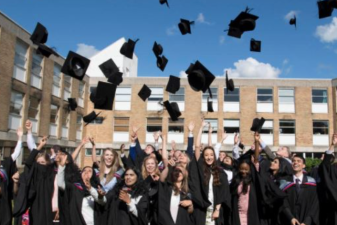In today's world, the organizational changes, career shifts, and policy changes brought about by new technologies, new business models, and new industries, especially since the outbreak of the COVID-19 pandemic in recent years, have profoundly impacted career choices and career development models. The job market has become increasingly volatile, and the career options facing college students have become more diverse.During the learning phase before students experience periods of confusion, teachers need to proactively guide them in addressing their life goals, career plans, and future development. This reduces the likelihood of students entering the workforce without clear goals and plans, making it difficult for them to establish crucial career plans and leading to difficulties and challenges in the workplace. Throughout the course, teachers use guiding and insightful language to share their own experiences and lessons learned with students, using examples of outstanding graduates and those with excellent career planning to inspire students to emulate and learn from these positive examples.
How much impact does a university education have on an individual's career development?
- Enhanced Employment Competitiveness:
University education provides students with systematic professional knowledge and practical skills training, making them competitive in the job market. Through university education, students master the professional knowledge and skills required for various careers, increasing their employment opportunities.
- Foundation for Lifelong Learning:
University education is not just about obtaining a diploma; more importantly, it cultivates students' learning abilities and a lifelong learning attitude. University education equips students with the skills of critical thinking, independent learning, and continuous learning, enabling them to adapt to a rapidly changing social and professional environment and achieve personal growth and development.
- Enhancement of Humanistic Competencies:
University education focuses on cultivating students' humanistic qualities. Through the study of subjects such as literature, philosophy, history, and art, students can appreciate beauty, understand the development and connotation of human civilization, enhance their aesthetic taste and moral qualities, and strengthen their overall qualities.
- Cultivation of a Scientific Spirit:
University education focuses on cultivating scientific research and innovative capabilities. Through participation in research projects and laboratory practice, students can develop critical thinking, a scientific spirit, and problem-solving skills, promoting academic progress and social development.
- Enhancement of Social Skills:
University education provides a diverse social environment where students can make friends from diverse backgrounds and participate in various clubs and activities. Through social interaction, students can improve their communication skills, interpersonal skills, and teamwork.
- Self-Awareness and Career Planning:
University education provides students with an opportunity to develop self-awareness and career planning. Through university learning and practice, students can better understand their interests, strengths, and values, form a clear career plan, and prepare for their future career path.
- Cultivating Entrepreneurial and Innovative Abilities:
University education encourages students to develop innovative thinking and entrepreneurial spirit, providing training and support for innovation and entrepreneurship. Through coursework and practical projects, students can learn innovative concepts and methods, cultivate market insight, and develop an entrepreneurial spirit.
- Global Vision and International Exchange:
University education provides students with opportunities for international exchange, broadening their global perspectives. Through exchange programs and study abroad experiences, students can gain understanding of different cultures, develop cross-cultural communication and cooperation skills, and enhance their international competitiveness.
- Cultivating a Sense of Social Responsibility and Civic Awareness:
University education emphasizes the cultivation of a sense of social responsibility and civic awareness. Through social practice courses and volunteer activities, students are encouraged to understand social issues, pay attention to social development, and actively participate in social welfare work, thereby cultivating a sense of civic responsibility.
- Popularization and Transmission of Scientific Culture:
University education is a crucial platform for the transmission of scientific culture. Through teaching, research, and transmission, students can carry forward and promote scientific culture, contributing to the scientific development and progress of society.
Conclusion
When students are fully developed, they can reflexively have a positive impact on the development of universities. High-quality employment for university graduates can establish a positive image for the university and help it present a positive trend in talent cultivation and recruitment. University graduates who accurately formulate their own development direction, carefully plan for it, and implement it can provide strong talent support for social development and the rational division of labor, leading to a positive overall employment situation in society. Therefore, providing students with necessary career planning education in higher education can fully reflect the scientific and advanced nature of the university's educational philosophy. It is committed to educating people for the sake of educating people, and demonstrates the university's care and attention throughout the entire process and at all stages of education, thereby empowering students to develop in a positive direction.









